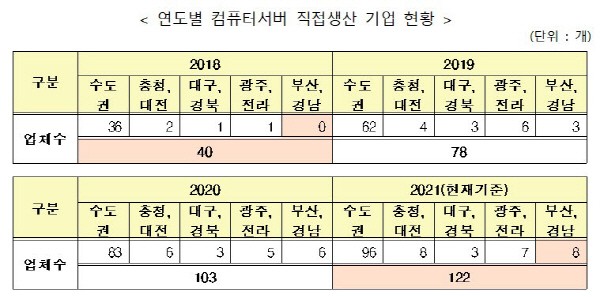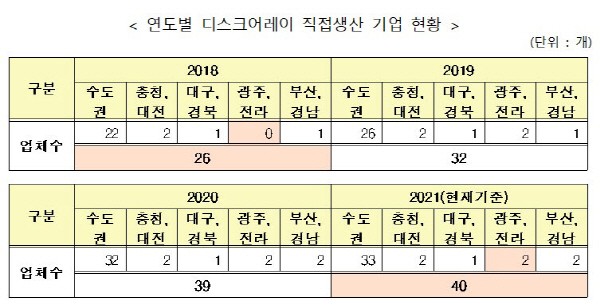Introduction of the mid-term competitive product system 'performance'
122 servers and 40 storage
Expansion of parts manufacturing and distribution companies nationwide

The number of small and medium-sized enterprises (SMEs) that directly produce servers in Korea has increased about 80 during last three years. It has been found that the competitive product system between SMEs has fostered the self-reliance of the domestic computing manufacturing industry. Not only servers, the number of direct producers of storage (disk array) nearly doubled during the same period. According to the Korea Computing Industry Association, the number of companies directly producing computer servers were only 40 in 2018 to 122 and 78 in 2019 and 103 in 2020 and increased to 122 as of October this year. The number of companies directly producing disk arrays also increased from 26 in 2018, 32 in 2019, and 39 in 2020 to 40 this year. In 2018, in Busan and Gyeongnam (computer server) and Gwangju and Jeolla (disk array) regions, there were no direct production companies at all, and now 8 new companies were established in last three years.

Parts manufacturing and distribution companies are also expanding nationwide. According to the shopping mall registration status of the Public Procurement Service, the number of companies and products participating in servers and disk arrays increased about 2.5 times from 205 products from 33 companies in 2018 to 525 products from 82 companies this year. Among them, 234 server products (65.5%) and 97 disk array products (57.1%) are competitive product between SMEs. Before the competitive product system between SMEs was implemented, the public market was formed by global corporate server and storage products, but after the system, domestically produced products are leading and changing the ecosystem.
The competitive products between SMEs have been designated since 2016 in order to overcome the low localization rate and strengthen technological competitiveness. From 2016 to 2018, products with an actual capacity of 100 terabytes (TB) or less and cache memory of 16 gigabytes (GB) or less were registered for the system but it increased up to products with an actual capacity of 100 TB or less and cache memory of 32 GB or less from 2019 to 2021.

The competitive product system between SMEs contributed to broadening the position of narrow domestic hardware (HW) such as servers and storage. On the 31st, Jong-woon Woo, chairman of the Korea Computing Industry Association, said, “With the competitive product system between SMEs, dozens of domestic manufacturing companies have been created in last four years and a sustainable ecosystem has been created. It is necessary to expand the system to secure the survival of domestic HW and revitalize the information technology (IT) industry.”
<Glossary>Competitive product system between SMEs = When a public institution purchases a product, it is a system in which a procurement contract is concluded through limited competitive bidding for small and medium-sized enterprises that directly produce products. A total of 612 items were designated as of February this year based on the Act on facilitation of purchase of small and medium enterprise-manufactured products and support for development of their markets. For the re-designation of items for 2022~2024, the Korea Federation of SMEs submitted candidate items to the Ministry of SMEs and Startups, leaving discussions with ministries and deliberation by the Steering Committee. Designated items will be announced through an administrative notice in coming December.
By Staff Reporter Da-in Oh (ohdain@etnews.com)